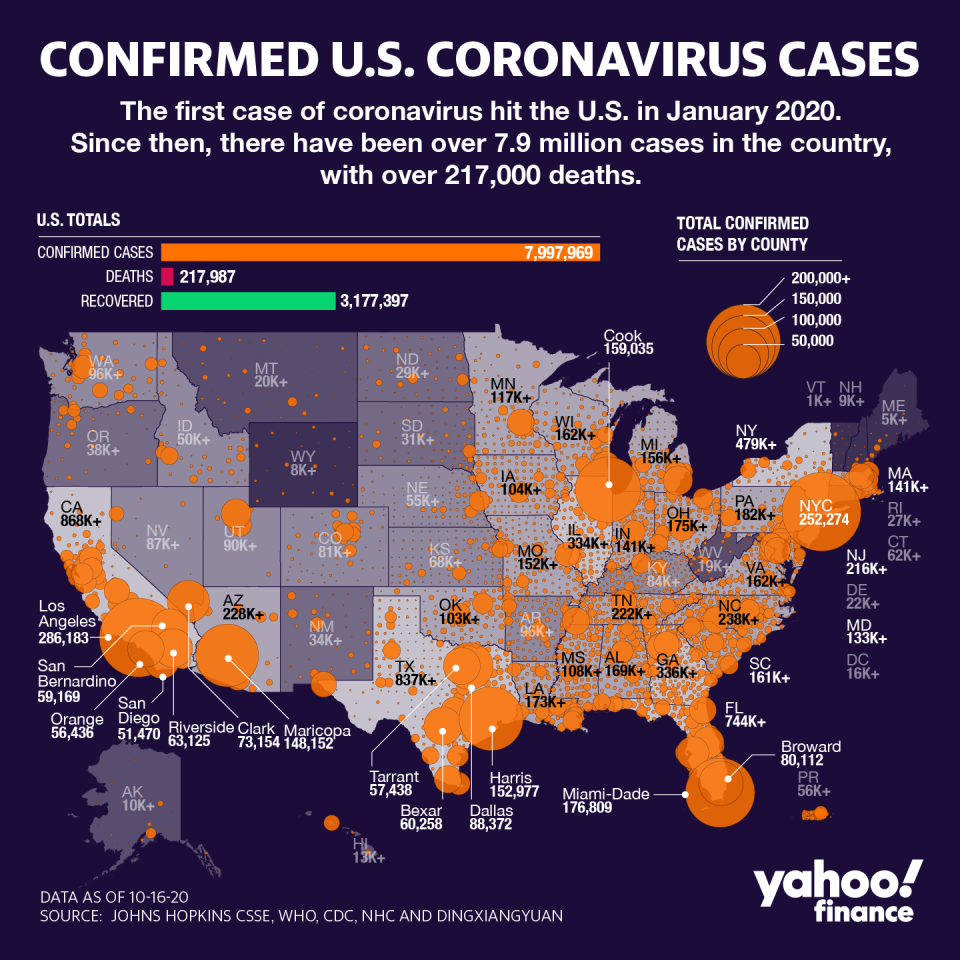'Not just him': What Trump's antibody use says about the future of coronavirus treatments
President Donald Trump’s recovery from COVID-19—and his aggressive advocacy of antibody cocktails as a “cure” — offer few immediate reasons for the general public to be immediately encouraged given their relative scarcity, costs and mostly unproven nature, according to several experts who spoke to Yahoo Finance.
Derived from man-made antibodies, monoclonal treatments for the novel coronavirus, including those made by Regeneron (REGN), Gilead (GILD) and Eli Lilly (LLY), have been touted as a potential “bridge” to an eventual vaccine.
Since his recovery from COVID-19, Trump has embraced experimental therapies as a panacea in the fight against the coronavirus, an idea that experts have taken pains to qualify for several reasons.
While promising, those cocktails— some of which were administered to the president earlier this month when he was first diagnosed with the coronavirus — are still in the experimental stage, carrying prohibitively high prices as well as risks to the patient.
Last week, both Johnson & Johnson (JNJ) and Eli Lilly hit the pause button on their respective trials, underscoring how advances made in the worldwide fight against the pandemic, while rapid, are still subject to unpredictable developments in the research process.
A number of experts raised eyebrows when it was revealed that Trump was treated with Regeneron’s cocktail, which has yet to receive the Food and Drug Administration’s official stamp for emergency use, making it even harder to determine its effectiveness on the general public.
Dr. Ezekiel Emanuel, the University of Pennsylvania’s vice provost, told Yahoo Finance in a recent interview that the scientific community “can't learn anything from a case of one.”
Amid nagging questions about the president’s case, Emanuel voiced skepticism that the “selection bias” inherent in such an unusual case made the process of yielding broader conclusions more fraught.
Given Trump’s unusual combination of Regeneron’s drug, Gilead’s remdesivir, and the corticosteroid dexamethasone, “He's certainly in a very tiny group, and it's hard to draw any conclusion on that basis,” said Emanuel, who served as President Barack Obama’s former health policy advisor.
“That's why we do research. That's why we actually include patients, we do randomized trials,” Emanuel said. “That he didn't get the Regeneron on a randomized trial I think is wrong and unethical. If he was going to get Regeneron, it should have been like everyone else, on a clinical trial.”

The rapid onset of the coronavirus pandemic also has created questions about how much insurers are willing to cover for costly treatments and hospital stays that can easily spiral higher, and how much manufacturing costs will be offset by lavish government subsidies.
It's remarkable it worked so well for him, we need to find out about other patients not just him.” Dr. Dara Kass, physician and Yahoo contributor
Another potential barrier is scale, according to experts. Although the federal government’s “Operation Warp Speed” has funneled billions into vaccine developments, practical limitations are blocking the ramp-up of antibody treatments, including a lack of manufacturing capacity and the costs to pharmaceutical companies making them.
Dr. Scott Gottleib, the former FDA commissioner who’s emerged as an independent voice on the pandemic, estimated recently that the U.S. only has the capacity to produce about half as many antibodies that it needs to treat soaring COVID-19 cases. Meanwhile, Trump has suggested that Americans should receive the treatments for free.
According to Dr. Dara Kass, giving away the cocktails for free “has never been part of the algorithm for new therapeutics invested in heavily. I think the president is putting the corporation in a difficult position touting this as [an] already miracle medication and also demanding they give it away for free,” she told Yahoo Finance last week.
Given that scenario and other reasons, Kass said it was “unlikely” those treatments could be scaled up and deployed widely in time to mitigate the ongoing crisis.
“The cocktail of antibodies [Trump] got, which basically mimics your own antibody response and given to people they think that are vulnerable and may not have massive antibody response yet is unavailable to regular Americans, even really in compassionate use,” said Kass, a Yahoo medical contributor.
Although drug companies frequently tout the endorsements of high-profile clients, the president’s case is atypical for several key reasons. Kass added, “This is one patient and it's functionally a case report” —made even more difficult by the president’s own high-risk characteristics such as age and weight.
“So these antibody cocktails are very, very promising, but it really does seem like the president is ahead [of] the science here. It's remarkable it worked so well for him; we need to find out about other patients not just him.”
Javier David is an editor for Yahoo Finance. Follow him on Twitter: @TeflonGeek
Follow Yahoo Finance on Twitter, Facebook, Instagram, Flipboard, LinkedIn, and reddit.
Find live stock market quotes and the latest business and finance news



